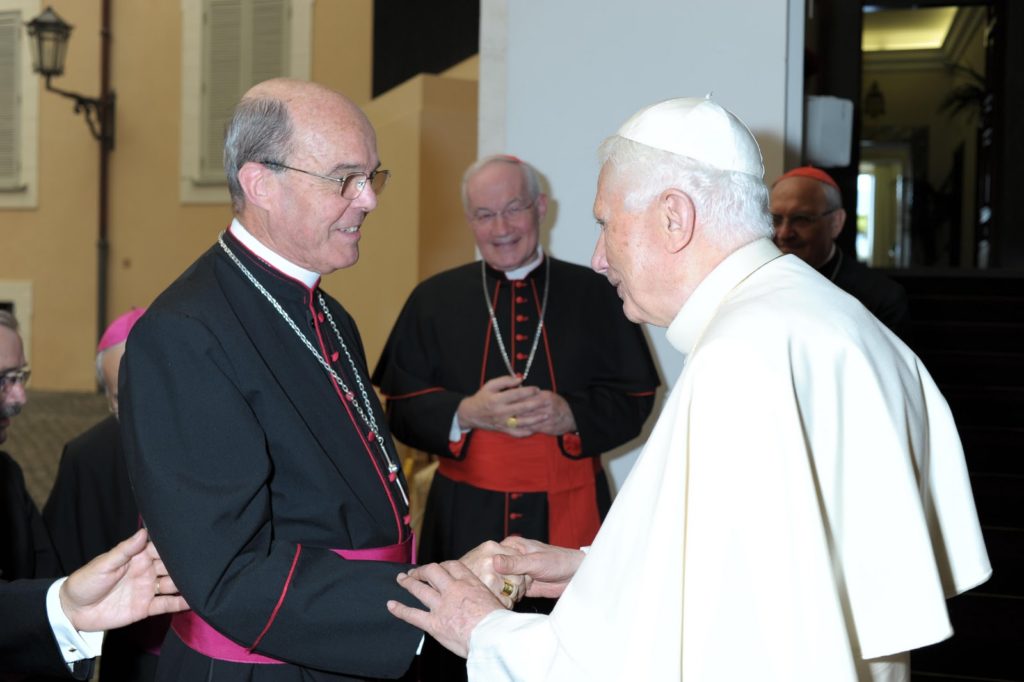




















It was Thursday, September 15, 2011, at Castelgandolfo. There were 119 of us bishops who were finishing the course for new prelates and none of us expected the news that Cardinal Ouellet gave us when he finished the audience with Pope Benedict XVI, as soon as he finished his speech: the Holy Father wanted to greet us personally, what an honor. Because of the number of us, we would line up and, when we reached him, we would tell the secretary, Monsignor Monteiro de Castro, the country and diocese of our origin, which he would communicate to the Pope; we would greet him and then we had to leave to make way for the next one.
With great affability
We went in an orderly fashion. Benedict XVI smiled at each one of us with great affability; some bishops did not fully respect the indications received; immediately a gentiluomo took him kindly by the arm...
"Uruguay, diocese of Minas", I told Monsignor Monteiro, who did not understand well and I had to repeat it. He transmitted it to the Pope. Leaning down, I took his right hand and kissed his ring. Then, looking me in the eyes, Benedict XVI said to me: "È un paese laico... È necessario sopravvivere!". I couldn't say anything, it was a complete surprise; I wanted to ask him something..., but he was already the gentiluomo, doing their duty...


You have to survive! I always remember it, even now that I am bishop emeritus of this beloved lay country. But I also do not forget that I owe Spain a lot and I carry it in my heart: studying in Navarra I discovered my vocation and in Madrid, in 1973, I was ordained a priest. I follow its current affairs, what is happening... and what remains. And I see that the process of secularization they are undergoing has many similarities with what happened in Uruguay, especially at the beginning of the 20th century. I will tell you something that you may be interested in knowing.
Tourism Week
I am writing these lines when there are only three days left until the beginning of Holy Week. I confess that I am envious that everyone refers to it by calling it what it is, Holy Week. Here, officially, it is Tourism Week, thus, with capital letters, since October 23, 1919, when the law of holidays was promulgated. This law secularized the religious holidays that until then were celebrated in Uruguay.
Cardinal Sturla, the current archbishop of Montevideo, in his book Holy or Tourism? Calendar and secularization in Uruguay, commenting on what happened he says: "By means of this law, the religious holidays that were celebrated in our country until then were secularized. But, in a very 'Uruguayan' solution, the same dates remained, changing their denomination". Indeed, in addition to other holidays (May 2, Spain Day, September 20, Italy Day, etc.), December 8 became Beaches Day, and December 25, Family Day. These last two changes have not taken root in Uruguayan culture; the week of tourism, on the other hand, has been...
A "very Uruguayan" solution
The "solution" referred to by Sturla refers to the strong parliamentary discussions that preceded the voting of the law; when he describes the solution as "very Uruguayan", he is thinking of the dialogic, "fixer" character that has always distinguished us: we are not friends of tremendousisms, we know how to find solutions to differences...
But the change from Holy Week to Tourism Week (I think it is the only country in the world where such a nonsense happens) caused a deep wound in the body of the Catholic Church. With the passing of the years and generations, the denomination and its content have become normal, so that the question "What are you going to do during Tourism Week" is spontaneous, as familiar as the weather...
The secularizing process began in 1861 with the decree that secularized the cemeteries, but it was in the constitutional reform of 1918 when the complete separation of Church and State in Uruguay was consecrated forever. "However." says Sturla, "The law of holidays, by touching fundamental elements of the culture of a people, such as the festivities and its calendar, introduced a change in our customs that would have deep repercussions and gave a serious blow to Uruguayan religiosity. Our 'tourism week', with its multiple offers of beer week, Creole week, cycling week, etc., is a clear example of what a cultural change that has concrete consequences in the culture of a nation means".
Eugenio d'Ors' diagnosis
That is how it is. Hand in hand with that event, and with the hidden and tenacious work of Freemasonry, Uruguayan culture was steeped in rationalism, liberalism... Eugenio D'Ors, who visited Montevideo in the second decade of the twentieth century, wrote in the New Glossary: "Nowhere in the world have we found audiences of more evident, quicker, almost tangible intelligence than the auditors of the university, in Montevideo. What students, what golden boys, with what pure and ardent vocation for spirituality, those who came to us! What young professors, of open curiosity, of perfect personal culture, of sure good taste, of lively talent!".
However, after sizes praised, in the "Debit" it pointed out: "The great Uruguayan superiority is political [...]; the great Uruguayan inferiority is cultural and lies in the lack of a true University, that is to say, of a Center even for higher studies in Literature, Science, Philosophy... Even in high school, the humanities are conspicuous by their absence."... And it speaks of the "third or fourth water positivism." that was taught in the university preparatory studies...
From philosophical emptiness to skepticism
The philosophical vacuum was filled with Marxism and with a relativism that leads to a closed skepticism. Yes, this is "a secular country," to the point that it is the least religious in all of America. (An investigation of the Pew Research on religiosity in Latin American countries, reported that "Uruguay is the only country surveyed where the percentage of adults who say they have no religious affiliation (37 %) rivals the portion who identify as Catholic (42 %).").
The Pope described us as a "secular country", the result of a Masonic secularism, aggressive in other times, which has permeated the culture of skepticism: if it is due to the absence of God, how can we explain that Uruguay has the highest number of suicides in the continent?
Mandatory religious ignorance
The secularist project of our country has reached the core of society: education. More than once I have accompanied someone who arrives in Uruguay for the first time and expresses his surprise at seeing groups of children in the street wearing white smocks and a blue bow tie... They are public school students, who are still in school. religiously that uniform, objectively out of fashion but which has been, since the beginning of the last century, the symbol of the public school, "secular, free and compulsory", as it was defined and today is dogmatically celebrated as national pride.
More than 80 % of our population is educated in public schools. Secular education is expressed in respect for all opinions and beliefs..., as long as there is no mention of the name of God. Anecdotes abound: a little girl has written in her notebook: "God is love". The teacher sees it and says: "Not that, not here". Another girl wears a little cross around her neck and the same thing happens: the teacher forces her to take it off.
Monsignor Miguel Balaguer, former bishop of Tacuarembó, was absolutely right when he affirmed thatThe secular, free and compulsory education has condemned us to compulsory religious ignorance". Thus, public school students will never hear a word about Jesus Christ, the Church, faith, hope... The children grow up without any mention of the supernatural, oblivious to the existence of God and, after so many years (their parents and grandparents also went to public school), indifferent to his existence: they do not even think about it.
The Church in Uruguay is alive
You have to survive! Benedict XVI said to me with animated energy. This is where we are. It is not easy: the Church in Uruguay is a poor Church; the priests do not receive any remuneration from the State, nor do the educational institutions, everything has to be done "on their own".
And in such a way has the secularist preaching reached the minds, that not a few Catholics think: private denominational education is free, anyone can give the teaching he wants; but the State's money should only go to the public school. It is not easy to survive, but thanks to God the Church in Uruguay "is alive", as Benedict XVI liked to say. How? This may be the subject of another chronicle.
Bishop emeritus of Minas (Uruguay).












